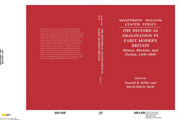Book contents
- Frontmatter
- Contents
- Preface
- WOODROW WILSON CENTER SERIES
- 1 Introduction
- 2 Precept, example, and truth: Degory Wheare and the ars historica
- 3 Truth, lies, and fiction in sixteenth-century Protestant historiography
- 4 Thomas More and the English Renaissance: History and fiction in Utopia
- 5 Little Crosby and the horizons of early modern historical culture
- 6 Murder in Faversham: Holinshed's impertinent history
- 7 Foul, his wife, the mayor, and Foul's mare: The power of anecdote in Tudor historiography
- 8 Experience, truth, and natural history in early English gardening books
- 9 Thomas Hobbes's Machiavellian moments
- 10 The background of Hobbes's Behemoth
- 11 Leviathan, mythic history, and national historiography
- 12 Protesting fiction, constructing history
- 13 Adam Smith and the history of private life: Social and sentimental narratives in eighteenth-century historiography
- 14 Contemplative heroes and Gibbon's historical imagination
- Contributors
- Index
- Titles in the series
13 - Adam Smith and the history of private life: Social and sentimental narratives in eighteenth-century historiography
Published online by Cambridge University Press: 04 August 2010
- Frontmatter
- Contents
- Preface
- WOODROW WILSON CENTER SERIES
- 1 Introduction
- 2 Precept, example, and truth: Degory Wheare and the ars historica
- 3 Truth, lies, and fiction in sixteenth-century Protestant historiography
- 4 Thomas More and the English Renaissance: History and fiction in Utopia
- 5 Little Crosby and the horizons of early modern historical culture
- 6 Murder in Faversham: Holinshed's impertinent history
- 7 Foul, his wife, the mayor, and Foul's mare: The power of anecdote in Tudor historiography
- 8 Experience, truth, and natural history in early English gardening books
- 9 Thomas Hobbes's Machiavellian moments
- 10 The background of Hobbes's Behemoth
- 11 Leviathan, mythic history, and national historiography
- 12 Protesting fiction, constructing history
- 13 Adam Smith and the history of private life: Social and sentimental narratives in eighteenth-century historiography
- 14 Contemplative heroes and Gibbon's historical imagination
- Contributors
- Index
- Titles in the series
Summary
The assumption that history should be written as a linear narrative of public life is an enduring legacy of the classical tradition in historiography. The link between linearity and public life was deeply held and far from trivial. Politics provided history with a coherent and dignified subject, while in turn the clarity of historical narrative made it a worthy and effective instrument of public instruction. In eighteenth-century Britain this understanding of historical writing retained enormous prestige, but characteristic tensions emerged between its ideal conception of narrative and a multiform practice responsive to a wider range of questions. This was an age, in short, that paid the highest tribute to the literary artistry of ancient historians while undermining some of the central assumptions on which classical politics and historiography were founded. Thus the same half century in which Britain eagerly welcomed David Hume, William Robertson, and Edward Gibbon as its triumvirate of classic historians also saw a busy experimentation with new historiographical genres that were only loosely connected with classical history-of-events, with its traditional focus on politics and statecraft.
The classical tradition in historiography was founded on the assumption of the primacy of public life. Not only the literary form of historiography but its scope, value, and dignity were predicated on the view that history is a record of the public actions of public men. In the eighteenth century, however, the usefulness of this definition came into question as its limitations became increasingly evident. Without abandoning their respect for the ancients, writers in many areas of literature and philosophy explored conceptions of the self and society that undermined the presumption that politics could still be treated as an autonomous realm, either of action or understanding.
- Type
- Chapter
- Information
- The Historical Imagination in Early Modern BritainHistory, Rhetoric, and Fiction, 1500–1800, pp. 318 - 342Publisher: Cambridge University PressPrint publication year: 1997
- 6
- Cited by



